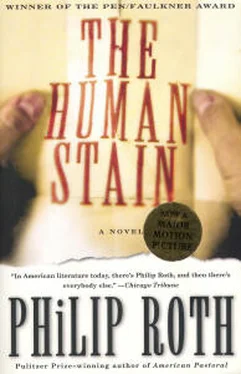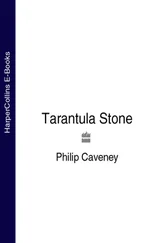On just my previous visit, Coleman had begun waving something in my face from the moment I'd come through the door, yet another document from the hundreds of documents filed in the boxes labeled “Spooks.” “Here. One of my gifted colleagues. Writing about one of the two who brought the charges against me — a student who had never attended my class, flunked all but one of the other courses she was taking, and rarely attended them. I thought she flunked because she couldn't confront the material, let alone begin to master it, but it turned out that she flunked because she was too intimidated by the racism emanating from her white professors to work up the courage to go to class. The very racism that I had articulated. In one of those meetings, hearings, whatever they were, they asked me, ‘What factors, in your judgment, led to this student's failure?’ ‘What factors? ’ I said. ‘Indifference. Arrogance. Apathy. Personal distress. Who knows?’ ‘But,’ they asked me, ‘in light of these factors, what positive recommendations did you make to this student?’ ‘I didn't make any. I'd never laid eyes on her. If I'd had the opportunity, I would have recommended that she leave school.’ ‘Why?’ they asked me. ‘Because she didn't belong in school.’”
“Let me read from this document. Listen to this. Filed by a colleague of mine supporting Tracy Cummings as someone we should not be too harsh or too quick to judge, certainly not someone we should turn away and reject. Tracy we must nurture, Tracy we must understand — we have to know, this scholar tells us, ‘where Tracy's coming from.’ Let me read you the last sentences. ‘Tracy is from a rather difficult background, in that she separated from her immediate family in tenth grade and lived with relatives. As a result, she was not particularly good at dealing with the realities of a situation. This defect I admit. But she is ready, willing, and able to change her approach to living. What I have seen coming to birth in her during these last weeks is a realization of the seriousness of her avoidance of reality.’ Sentences composed by one Delphine Roux, chairman of Languages and Literature, who teaches, among other things, a course in French classicism. A realization of the seriousness of her avoidance of reality. Ah, enough. Enough. This is sickening. This is just too sickening.”
That's what I witnessed, more often than not, when I came to keep Coleman company on a Saturday night: a humiliating disgrace that was still eating away at someone who was still fully vital. The great man brought low and suffering still the shame of failure. Something like what you might have seen had you dropped in on Nixon at San Clemente or on Jimmy Carter, down in Georgia, before he began doing penance for his defeat by becoming a carpenter. Something very sad. And yet, despite my sympathy for Coleman's ordeal and for all he had unjustly lost and for the near impossibility of his tearing himself free from his bitterness, there were evenings when, after having sipped only a few drops of his brandy, it required something like a feat of magic for me to stay awake.
But on the night I'm describing, when we had drifted onto the cool screened-in side porch that he used in the summertime as a study, he was as fond of the world as a man can be. He'd pulled a couple of bottles of beer from the refrigerator when we left the kitchen, and we were seated across from each other at either side of the long trestle table that was his desk out there and that was stacked at one end with composition books, some twenty or thirty of them, divided into three piles.
“Well, there it is,” said Coleman, now this calm, unoppressed, entirely new being. “That's it. That's Spooks. Finished a first draft yesterday, spent all day today reading it through, and every page of it made me sick. The violence in the handwriting was enough to make me despise the author. That I should spend a single quarter of an hour at this, let alone two years ... Iris died because of them? Who will believe it? I hardly believe it myself any longer. To turn this screed into a book, to bleach out the raging misery and turn it into something by a sane human being, would take two years more at least. And what would I then have, aside from two years more of thinking about ‘them’? Not that I've given myself over to forgiveness. Don't get me wrong: I hate the bastards. I hate the fucking bastards the way Gulliver hates the whole human race after he goes and lives with those horses. I hate them with a real biological aversion. Though those horses I always found ridiculous. Didn't you? I used to think of them as the WASP establishment that ran this place when I first got here.”
“You're in good form, Coleman — barely a glimmer of the old madness. Three weeks, a month ago, whenever it was I saw you last, you were still knee-deep in your own blood.”
“Because of this thing. But I read it and it's shit and I'm over it. I can't do what the pros do. Writing about myself, I can't maneuver the creative remove. Page after page, it is still the raw thing. It's a parody of the self-justifying memoir. The hopelessness of explanation.” Smiling, he said, “Kissinger can unload fourteen hundred pages of this stuff every other year, but it's defeated me. Blindly secure though I may seem to be in my narcissistic bubble, I'm no match for him. I quit.”
Now, most writers who are brought to a standstill after rereading two years' work — even one year's work, merely half a year's work — and finding it hopelessly misguided and bringing down on it the critical guillotine are reduced to a state of suicidal despair from which it can take months to begin to recover. Yet Coleman, by abandoning a draff of a book as bad as the draft he'd finished, had somehow managed to swim free not only from the wreck of the book but from the wreck of his life. Without the book he appeared now to be without the slightest craving to set the record straight; shed of the passion to clear his name and criminalize as murderers his opponents, he was embalmed no longer in injustice. Aside from watching Nelson Mandela, on TV, forgiving his jailers even as he was leaving jail with his last miserable jail meal still being assimilated into his system, I'd never before seen a change of heart transform a martyred being quite so swiftly. I couldn't understand it, and I at first couldn't bring myself to believe in it either.
“Walking away like this, cheerfully saying, It's defeated me,' walking away from all this work, from all this loathing — well, how are you going to fill the outrage void?”
“I'm not.” He got the cards and a notepad to keep score and we pulled our chairs down to where the trestle table was clear of papers. He shuffled the cards and I cut them and he dealt. And then, in this odd, serene state of contentment brought on by the seeming emancipation from despising everyone at Athena who, deliberately and in bad faith, had misjudged, misused, and besmirched him — had plunged him, for two years, into a misanthropic exertion of Swiftian proportions — he began to rhapsodize about the great bygone days when his cup ranneth over and his considerable talent for conscientiousness was spent garnering and tendering pleasure.
Now that he was no longer grounded in his hate, we were going to talk about women. This was a new Coleman. Or perhaps an old Coleman, the oldest adult Coleman there was, the most satisfied Coleman there had ever been. Not Coleman pre-spooks and unmaligned as a racist, but the Coleman contaminated by desire alone.
“I came out of the navy, I got a place in the Village,” he began to tell me as he assembled his hand, “and all I had to do was go down into the subway. It was like fishing down there. Go down into the subway and come up with a girl. And then”—he stopped to pick up my discard—“all at once, got my degree, got married, got my job, kids, and that was the end of the fishing.”
Читать дальше












